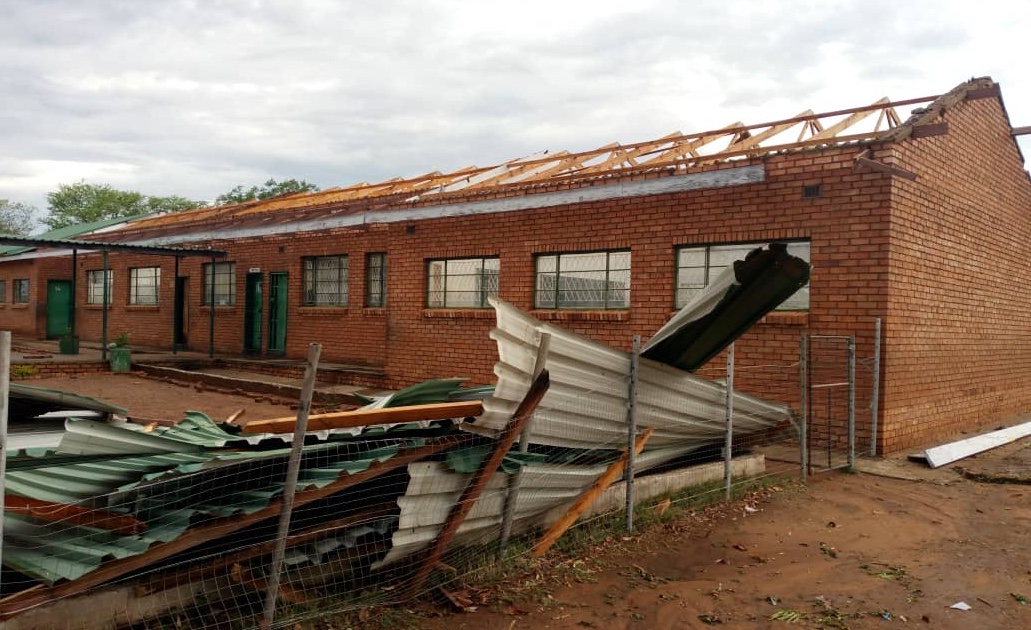As Zimbabwe enters its rainy season, members of Parliament and the Senate are calling on the government to implement preparedness measures to protect rural schools from the impact of heavy rains and high winds.
With ageing infrastructure at many rural schools, these severe weather conditions often damage buildings, disrupting education and putting both students and teachers at risk.
For rural schools, the rainy season brings heightened concerns. Past storms have ripped off roofs, damaged classrooms, and forced temporary closures.
In recent years, numerous schools in areas like Gwanda, Nkayi, and Binga have suffered significant storm damage, with some suspending classes until repairs could be made.
The Meteorological Services Department (MSD) is forecasting above-average rainfall for the 2024-2025 season, making disaster preparedness more urgent than ever.
Gutu East MP Benjamin Ganyiwa recently raised the issue in Parliament, urging the Civil Protection Unit (CPU) and other relevant departments to be proactive in protecting vulnerable communities.
“With the rainy season upon us, we need to ensure we are ready to help those affected by flooding and storm damage, which impact both homes and schools,” Ganyiwa said. He highlighted that MPs often bear the burden of assisting affected areas with limited resources and called for coordinated efforts across government departments.
Senator Robson Mavenyengwa also questioned the Ministry of Primary and Secondary Education’s preparedness, particularly for schools in high-risk areas like Mwenezi, where some students are taught outdoors.
“Minister, we are into the rain season. In areas like Mwenezi where children learn outside, what plans do they have to ensure that they are sheltered even under tents? Secondly, we have seen that a lot of schools are being blown away by storms. What is their state of preparedness together with the Civil Protection Unit (CPU), so that children will not lose a lot of time not going to school after the roofs are blown away,” he said.
Deputy Minister of Primary and Secondary Education, Angeline Gata, affirmed the Ministry’s commitment to disaster management.
She acknowledged that many schools require constant maintenance due to ageing structures vulnerable to high winds and rain. Gata called for the inclusion of a disaster relief fund in the national budget to support school repairs, a proposal intended to prevent prolonged closures after storm damage.
“ When classrooms are blown away, we see that happening in several areas because our schools need continuous attention and maintenance. Now, because of ageing, these winds and the storms are so harsh and they are blowing away the roofs. As a Ministry, we have disaster management because we work as a whole of Government. So, we go to the Local Government and they assist us because they have a risk or disaster management team,” she said.
Civil Protection Unit Director Nathan Nkomo stressed the importance of rapid response and recovery efforts to minimise disruptions in the education sector.
He outlined the CPU’s strategy for addressing storm damage at schools, which involves district-level response plans tailored to localised needs.
What is important is that we are now in our rainfall season and rainfall season as predicted by the Meteorological department is accompanied by heavy winds, hail storms, and to date as you can see, quite several social amenities infrastructure have been destroyed and our only way, we cannot avoid that from happening, our only way is to quickly address some of the challenges, especially in the learning environment where schools are affected, we need to quickly recover from the effects of such eventualities,” said Nkomo.
“Normally, where the situation is clear, we always opt for relief in terms of infrastructure, food assistance and relief in terms of any other assistance that a community might require. That is our first issue because we need to save lives.”
Nkomo outlined that response plans are already in place across all districts to ensure that each area can handle localized incidents efficiently
“From there, we get into the recovery part, as a country you know we are decentralized, all local government structures and every district is now active and the requirement is that every District must have a response plan to handle peculiar incidences in their various provinces. Because of geographical differences, some of these national calamities come in various forms and we end up having different areas affected differently, so every administrative structure must have a response plan.
“It is our wish to have these response plans at the household level because I am sure the disaster risk management starts at any community which is a homestead,” he said.
With Parliament and the Senate actively pushing for increased government support and disaster preparedness, there is hope for better protection of rural schools this rainy season.
By investing in proactive measures, the country can help safeguard its students’ education, minimise disruption, and build resilience against the annual impact of severe weather.

